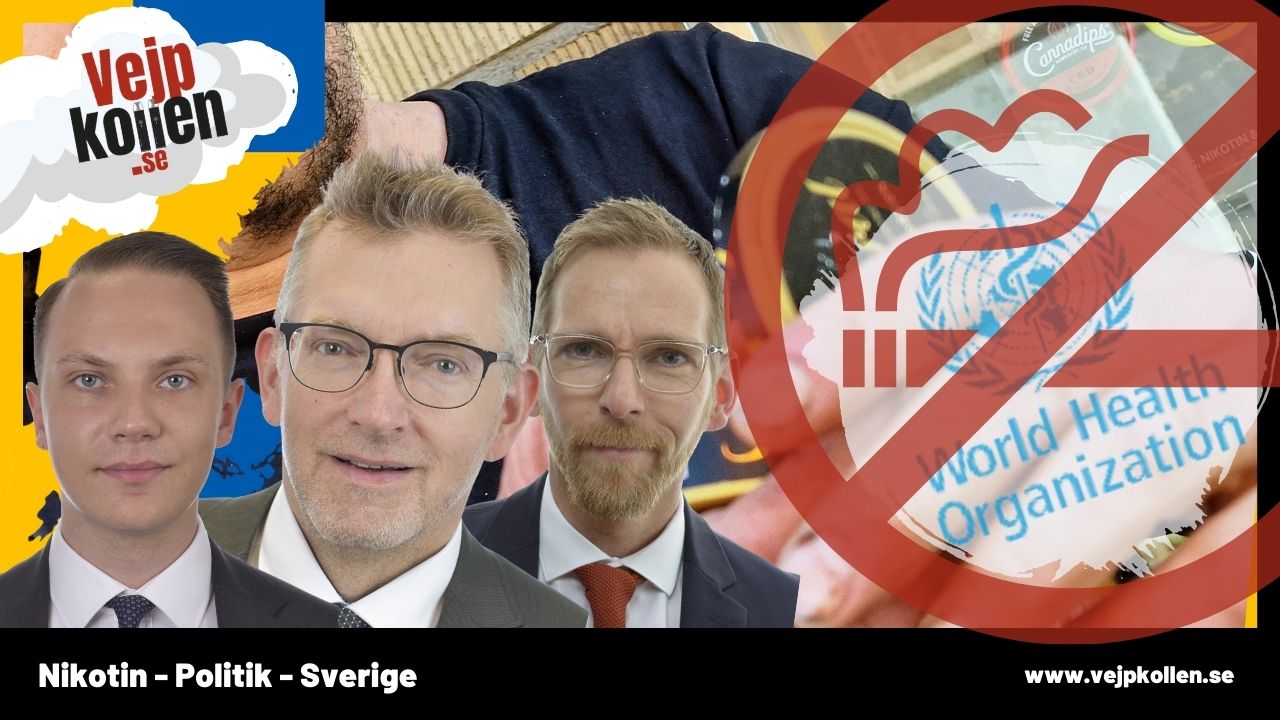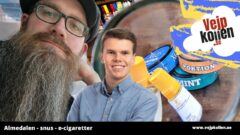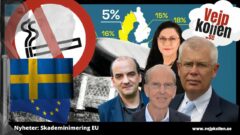Swedish politicians are worried about upcoming international restrictions on nicotine pouches and other smokeless nicotine products. The reason is the upcoming meeting of the WHO's tobacco convention, COP10, where heated tobacco, e-cigarettes but also white snus are identified as threats to public health.
"We must defend our Swedish harm reduction products," writes Tobias Andersson, chair of the Enterprise Committee.
The WHO is expected to propose strong measures to prevent the spread of e-cigarettes, heat-not-burn products and nicotine pouches. This comes after the organisation published a series of reports to inform discussions on the revision of the Global Tobacco Convention. On 20 November, the parties will meet in Panama to agree on guidelines for the countries that have signed the Convention. Sweden signed the Convention in 2005 and has committed to implement the guidelines in legislation.
"Given that Sweden has the lowest smoking rate in the EU and is on the threshold of achieving the WHO's ambition of a "smoke-free generation" in which 5 per cent or less of the population are smokers, i.e. that daily smoking in Sweden amounts to 6 per cent, according to the Swedish Public Health Agency, Sweden can be an important voice in achieving a reduction in smoking in the world, if we want to. But then Sweden needs a clear line and position that also defends our Swedish, harm-reducing tobacco and nicotine products." writes Tobias Andersson (S&D), chairman of the Committee on Economic and Monetary Affairs, i a call to the Minister of Social Affairs, Jakob Forssmed.
"Great importance for public health"
Tobias Andersson is supported by the Member of Parliament Isak From (s) who argues that the Swedish snuff tradition has led to the fewer smokers and that this has a positive impact on public health.
"Compared to other countries, very few Swedes are affected by lung cancer. Swedes can therefore live longer, contribute to the development of society and save us taxpayers costly care. Sweden has come further than any other country in Europe on the road to becoming smoke-free. This is of great importance for public health and for society as a whole." writes Isak From, also in a swritten question to Jakob Forssmed, Minister for Social Affairs.
Difference in risk between different nicotine uses
The use of alternative nicotine products has increased in Sweden. At the same time, smoking has declined rapidly. According to a recent punpublished report from CAN the number of daily smokers is between 5% and 6% - a figure that the organisation predicts will fall further if the trend continues.
According to Isak From, nicotine is indeed addictive, but he refers to the Public Health Agency of Sweden's recent report on the various harmful effects of nicotine products, in which they the relative risks between smoking and smokeless nicotine use were examined..
"There are currently no studies showing that "white snus" has any serious side effects, although "risks cannot be excluded". Compared to the documented dangerous cigarette, this must be seen as a major public health policy success," writes Isak From.
No "positions" yet
Both Tobias Andersson and Isak From have asked Minister for Social Affairs Jakob Forssmed to provide information on how the government and the Ministry of Social Affairs will act during the WHO meeting in Panama. According to Jakob Forssmed, there is currently no clear plan for the Swedish delegation in Panama. Except that they intend to attend the meeting.
"It is positive that tobacco smoking has gradually decreased and that Sweden has a comparatively low proportion of smokers. The costs to society of smoking are high and prevention and preventive measures are important. Preventive work can also create the conditions for equal health." writes Jakob Forssmed in his response but admits that "the Swedish positions for the meetings of the parties have not yet been developed."





Dear Sweden, Being representatives of an elected government participating in the world technology development which might continue the coming years, the G20 meeting in New Delhi the last Sunday with representatives of 125 countries worldwide participating serve as guidelines for coming WHO meeting needs clear Swedish guidelines.
That's sad.
vfg
just make smoking illegal, like other drugs.
They should stop growing tobacco altogether and find another crop such as bio-fuel.
I was eight years of age and was on holiday in Ostend, Belgium, watching a cycle race when a young teenage girl approached me with a wicker tray filled with sample packs of cigarettes.
Each pack containing just two cigarettes as that is all it takes to start the addiction.
Nicotine acts on the brain in a similar fashion as heroin so that makes these tobacco companies 'legitimised' drug dealers.
Governments globally should acknowledge that this is simply not good enough.
Many of us started SMOKING when we were in our early teens. No flavours. No fancy packaging. Just cigarettes and smoke. And to be perfectly honest, I loved it from the start. See, nicotine is quite pleasant to use. Similar to coffee, which I for one started using at the same time. Many of us don't like the addiction as you do. Some actually like it. The problem, in contrast to caffeine, is that nicotine is most commonly consumed by smoking. And the smoke is deadly. If a smoker can quit the smoking part, and still enjoy nicotine, that means most of the harms are gone. The addictions stays the same, but so what? Of course, from an extreme point of view, any addiction is per definition potentially harmful and should be avoided. But at the same time - humans tend to enjoy addictive substances - for different reasons - and one might argue that this is part of being human (as mentioned, we consume coffee, eat sugary candy, drink alcohol etc).
As for the enviromental part. Of course any agricultural impact that can be amended by moving production from a field to a lab is a good thing, in my humble opinion. Nicotine is a chemical that can be made artificially - but as of right now - it doesn't fit the market due to high costs and low revenue from smoke free nicotine products. The solution lies in a change of stance - where policies promote smokers to swirl (or just quit) using CIGARETTES in favour of smoke free nicotine products. Sadly, this is not happening - in part due to the focus on nicotine and ADDICTION from medical interest groups which inflict policy makers (via the WHO per example). But if the big players see revenue in something else than cigarettes - we might see a change - enviromentally and health wise.
Stefan Mathisson
Editor-in-chief
Vejpkollen.se
Since it is obvious that the drift towards the protection of purely economic interests through the measures imposed in recent years, without taking into account the public health that it permanently claims, this organisation has become harmful and may, perhaps, be better off ceasing to exist.
Translation (by the editors via Google translate):
Since it is obvious that the drive to protect certain purely economic interests through the measures introduced in recent years, without taking into account public health as it constantly demands, this organisation has become harmful and perhaps it would be better to no longer exist!
Since it is obvious that the drift towards the protection of purely economic interests through the measures imposed in recent years, without taking into account the public health that it permanently claims, this organisation has become harmful and may, perhaps, be better off ceasing to exist.
Translation (by the editors via Google translate):
Since it is obvious that the drive to protect certain purely economic interests through the measures introduced in recent years, without taking into account public health as it constantly demands, this organisation has become harmful and perhaps it would be better to no longer exist!